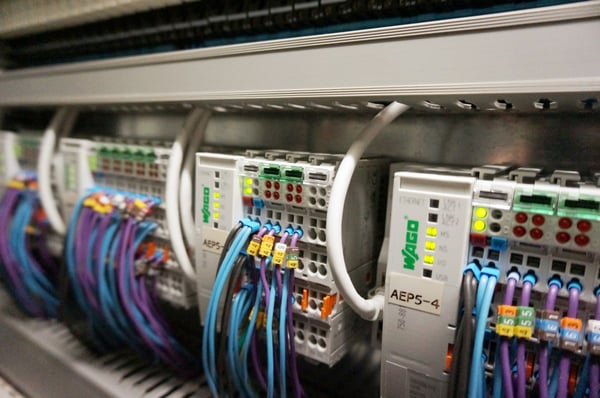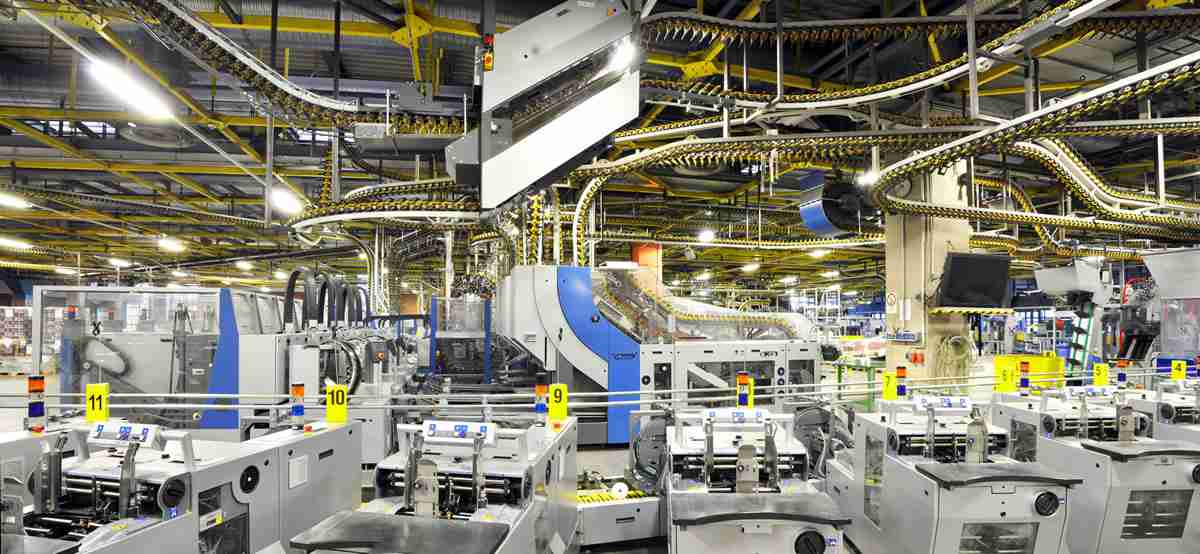In today’s fiercely competitive industrial landscape, delivering high-quality, consistent products at a competitive price is essential. To meet this demand, numerous industries are exploring new product designs and integrated manufacturing techniques while leveraging automated devices.
At Scientific Gate, we offer remarkable and influential industrial automation services to help you overcome these challenges. Our industrial automation solutions are designed to enhance product quality, reliability, and production rates while effectively reducing production and design costs. By adopting cutting-edge technologies and innovative services, we enable your business to thrive in the face of increasing competition.
Our Industrial Automation Services include:
- Process Optimization: We optimize your manufacturing processes by identifying inefficiencies and implementing automated solutions. This ensures streamlined operations, improved productivity, and reduced waste.
- Equipment Integration: Our team specializes in seamlessly integrating diverse machines and equipment into a cohesive and synchronized system. This integration enhances overall efficiency, minimizes downtime, and enables real-time monitoring and control.
- Robotics and Control Systems: We leverage advanced robotics and control systems to automate repetitive tasks, enabling faster and more accurate operations. This leads to increased production rates and higher output consistency.
- Customized Solutions: We understand that each industry and business has unique requirements. Our experts work closely with you to develop tailored automation solutions that align with your specific needs, ensuring optimal results and maximum ROI.
- Data Analytics and Insights: Our services encompass data-driven analytics, empowering you with valuable insights into your manufacturing processes. By harnessing this information, you can make informed decisions, identify improvement opportunities, and enhance overall operational efficiency.
By partnering with Scientific Gate for industrial automation services, you gain a competitive edge in the market. Our comprehensive approach, integrating new technologies and adopting innovative strategies, enables you to achieve superior product quality, enhanced reliability, increased production rates, and cost optimization.
Contact us today to discover how our industrial automation services can transform your operations and drive your business towards success in the ever-evolving industry.
Our Brands

What is Industrial Automation?
Industrial Automation is the use of control systems, including machines, actuators, sensors, processors, and networks to perform tasks, with the goal of automating production.
The history of industrial automation started with simple conveyor belts pulling parts through an assembly line. Machines performed basic tasks and work that reduced manual labor. Today, industrial automation is a wide range of machines, actuators, sensors, processors, and networks that work to connect an industrial environment. From PLCs, AI, Machine Learning, and IIoT devices, modern industrial automation is focusing on the best way to leverage technology. The following will introduce industrial automation, its types, and its benefits that are leading global industries, expanding markets, and evolving competition.

PLCs (programmable logic controllers) are a critical component of building a connected industrial environment.
Types of Industrial Automation Systems
Ranging from a conveyor belt to advanced AI and Machine Learning systems, it is important to understand the types of industrial automation to pinpoint where each technology will find the greatest benefit. Not every solution or trend will fit your application or goals.
Fixed Automation
Fixed automation often has a set task, continuous workflow, large volume production, and a high barrier of entry. Also called hard automation, this type of industrial automation rarely sees changes. The expense and time associated with a new product or changes in production are high. For lower volume or shorter product life cycles, programmable industrial automation will yield greater benefits.
Programmable Automation
Often associated with batch production, programmable automation works well for making several dozens to thousands of units. The lower production volume results in more changeovers which are considered when determining batch sizes and lead times. However, many companies are concerned with improving uptimes and increasing production. These goals are leading to more flexible automation.
Flexible Automation
As industrial automation types progress the processes seem to involve less human interaction and downtime while increasing the range of products produced on one machine or production line. Flexible automation often involves precise electromechanical controls; A CNC machine is a good example. Changeovers can be performed automatically reducing downtimes. This works well for batch production but allows for a more in-demand production and increased customization.
Integrated Automation
Integrating devices and machines onto a single control system connects the dots between processes, production lines, and more. Integrated automation is a more holistic approach to manufacturing. As IIoT and Industry 4.0 advance, independent machines and production lines are able to communicate on a network to become increasingly flexible and move towards in-demand manufacturing and increased customization.
A trend driving industrial automation is monitoring devices that are quick and easy to integrate into any type of automation. Real-time monitoring can produce data to make production decisions, adjust the supply chain, or manage labor. Monitoring will help decision-makers determine where and how industrial automation will yield the greatest results.
The Benefits of Industrial Automation
There are several advantages of industrial automation with manufacturers, OEMs, and industrial operations can leverage to increase operational efficiency.
Monitoring provides data to make sure new automated solutions meet goals. If production data exists in silos it will be difficult to find how to integrate automation solutions. Data from all assets will yield the greatest benefits. To keep data from becoming a liability, find IIoT and monitoring devices that offer built in security. Encryption, gateway protection, and Cloud services are some of the features that act like security guards to keep your assets protected. With security in mind, consider which of the following benefits might provide the greatest value to your application.
Improve Worker Safety
To start, industrial automation can help free workers from dull, dangerous, and dirty tasks. Industrial automation can reduce injuries associated with repetitive motion and lifting objects to create a safer work environment. This initial benefit can make a worker’s day-to-day better while freeing them for more complex tasks.
Increase Productivity
Downtime, performance problems, and bottlenecks all slow down production. Using monitoring and automated devices communicating across a single platform these problems can be found and mitigated before production slows. Downtime and performance problems can be reduced or eliminated through data that offers predictive maintenance. Real-time information is able to find root causes of problems, regulate inventory, and monitor production speeds so adjustments can happen before bottlenecks occur.
Higher Quality
Connected automation devices offer greater repeatability, higher fidelity, data collection from almost anywhere in a production line, and send notifications to anyone with access. Catching changes in quality early can improve production, reduce waste, cut down on rework, and increase profit. Additionally, automation devices able to verify and validate quality can improve transparency and ensure parts produced meet a customer’s requirements before leaving the factory floor.
Better Decision Making
As more devices are connected and controlled with industrial automation tools, managers will be able to generate more accurate models to find new revenue streams and provide better estimates to build stronger relationships with stakeholders. Industrial automation technology can increase the ability to monitor and control multiple locations remotely for a holistic solution that can streamline supply chain management, track assets in the field, and provide data to make more informed decisions.
Other Services
- Automation Solutions: Providing cutting-edge automation solutions for industrial processes.
- Industrial Robotics: Integrating robotic systems to enhance efficiency and productivity in manufacturing.
- Process Optimization: Optimizing industrial processes through automation to streamline operations.
- PLC Programming: Expertise in programming Programmable Logic Controllers (PLCs) for precise control.
- SCADA Systems: Implementing Supervisory Control and Data Acquisition (SCADA) systems for real-time monitoring.
- IoT Integration: Integrating Internet of Things (IoT) technologies for interconnected industrial systems.
- Smart Factory Solutions: Building smart factories with automated and data-driven processes.
- Manufacturing Efficiency: Enhancing manufacturing efficiency through automated workflows.
- Remote Monitoring: Enabling remote monitoring and control of industrial processes.
- Robotics Integration: Introducing robotics into industrial processes for increased productivity.
- Automated Assembly Lines: Designing and implementing automated assembly lines for mass production.
- Sensors and Actuators: Utilizing advanced sensors and actuators for precise control.
- Energy Efficiency: Incorporating automation to optimize energy consumption in industries.
- Real-time Analytics: Providing real-time data analytics for better decision-making.
- Predictive Maintenance: Implementing predictive maintenance solutions to minimize downtime.
- Quality Control Automation: Ensuring consistent quality through automated quality control systems.
- Industrial IoT (IIoT): Leveraging IIoT for data-driven insights and predictive analytics.
- Automated Material Handling: Streamlining material handling processes through automation.
- Industrial Instrumentation: Expertise in instrumentation for accurate data collection and control.
- Safety Automation: Implementing automation solutions to enhance industrial safety protocols.

